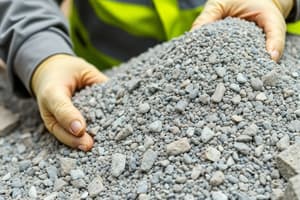Podcast
Questions and Answers
What is the primary goal of construction materials testing?
What is the primary goal of construction materials testing?
- To ensure the safety and durability of buildings (correct)
- To minimize the use of materials
- To increase construction costs
- To speed up the construction process
What is the purpose of destructive testing in construction materials testing?
What is the purpose of destructive testing in construction materials testing?
- To reduce the costs of materials
- To enhance the appearance of materials
- To assess the strength and durability of materials (correct)
- To promote recycling of materials
Which method of construction materials testing involves testing materials in their actual environmental conditions?
Which method of construction materials testing involves testing materials in their actual environmental conditions?
- Non-Destructive Testing
- Laboratory Testing
- Destructive Testing
- Field Testing (correct)
What role does construction materials testing play in identifying issues during the construction process?
What role does construction materials testing play in identifying issues during the construction process?
Why is construction materials testing considered critical in the construction industry?
Why is construction materials testing considered critical in the construction industry?
What is the significance of verifying the quality and performance of construction materials?
What is the significance of verifying the quality and performance of construction materials?
What is the primary focus of nondestructive testing?
What is the primary focus of nondestructive testing?
Which trend in construction materials testing involves the use of machine learning algorithms?
Which trend in construction materials testing involves the use of machine learning algorithms?
What is a key aspect of smart testing systems in construction materials testing?
What is a key aspect of smart testing systems in construction materials testing?
How do advanced technologies contribute to construction materials testing?
How do advanced technologies contribute to construction materials testing?
What is the main reason for the focus on sustainability in construction materials testing?
What is the main reason for the focus on sustainability in construction materials testing?
Why is it important for the construction industry to stay up-to-date with advancements in materials testing?
Why is it important for the construction industry to stay up-to-date with advancements in materials testing?
Flashcards are hidden until you start studying
Study Notes
Construction Materials Testing
Construction materials testing is a critical aspect of the construction industry, ensuring the safety, durability, and performance of various building components. The testing process involves subjecting materials to various physical and mechanical challenges to determine their suitability for specific applications. This article provides an overview of construction materials testing, including the importance, methods, and current trends in the field.
Importance of Construction Materials Testing
The primary goal of construction materials testing is to verify the quality and performance of materials used in construction projects. This ensures that the buildings are safe, durable, and meet the required standards. Additionally, testing helps identify any potential issues early in the construction process, allowing for necessary adjustments to be made before significant problems occur.
Methods of Construction Materials Testing
There are several methods used in construction materials testing, including:
-
Laboratory Testing: This involves subjecting materials to controlled conditions in a lab to assess their properties and performance.
-
Field Testing: This involves testing materials in their actual environmental conditions to determine their performance under real-world conditions.
-
Destructive Testing: This involves testing materials by intentionally damaging them to assess their strength and durability.
-
Nondestructive Testing: This involves testing materials without damaging them, using techniques such as ultrasonic testing, X-ray testing, and magnetic particle inspection.
Current Trends in Construction Materials Testing
The field of materials testing in civil engineering is constantly evolving, with a focus on developing more efficient, accurate, and cost-effective testing methods. Some current trends in the field include:
-
Use of Advanced Technologies: There is increased adoption of digital tools like software platforms and mobile apps that facilitate real-time communication, data collection, and analysis.
-
Smart Testing Systems: There is a push towards developing smart testing systems that can automatically monitor and analyze material properties and performance in real-time.
-
Integration with AI and Machine Learning: Machine learning algorithms are being integrated into testing processes to predict material performance and identify potential issues.
-
Focus on Sustainability: With growing concerns about climate change and resource depletion, there is a shift towards developing sustainable testing methods that minimize waste and reduce energy consumption.
Conclusion
Construction materials testing plays a vital role in ensuring the safety, durability, and performance of building materials. As technology advances, the field continues to evolve, with a focus on developing more efficient, accurate, and sustainable testing methods. By staying up-to-date with these advancements, the construction industry can continue to deliver high-quality, resilient structures that stand the test of time.
Studying That Suits You
Use AI to generate personalized quizzes and flashcards to suit your learning preferences.




